


 3:50:15
3:50:15  2019-05-18
2019-05-18  1542
1542

Grand Ayatollah Sistani in his Islamic jurisprudential publications explains the methods of ascribing the first day of a lunar month as follows:
“1739. The first day of a month is established in the following four ways:
• If a person himself sights the moon.
• If a number of persons confirm to have sighted the moon and their words assure or satisfy a person. Similarly, every other thing which assures or satisfies him about the moon having being sighted.
• If two just (Adil) persons say that they have sighted the moon at night. The fist day of the month will not be established if they differ about the details of the new moon. This difference can be either explicit or even implied.
For example, when a group of people go out in search of the new moon and none but two Adils claim to have seen the new moon, though, among those who did not see, there were other Adils equally capable and knowledgeable, then the testimony by the two Adils will not prove the advent of a new month.
• If 30 days pass from the first of Sha’ban, the first of Ramadhan will be established, and if 30 days pass from the l first of Ramadhan the first of Shawwal will be established.
1740. The first day of any month will not be proved by the verdict of a Mujtahed and it is better to observe precaution.
1741. The first day of any month will not be proved by the prediction made by the astronomers. However, if a person derives full satisfaction and certitude from their finding, he should act accordingly.
1742. If the moon is high up in the sky, or sets late, it is not an indication that the previous night was the first night of the month. Similarly, if there is a halo round it, it is not a proof that the new moon appeared in the previous night.
1743. If the first day of the month of Ramadhan is not proved for a person and he does not observe fast, and if it is proved later that the preceding night was in fact the night of Ramadhan, he should observe qada of that day.
1744. If the first day of a month is proved in a city, it is also proved in other cities if they are united in their horizon. And the meaning of having a common horizon in this matter is that if the new moon was sighted in a city, there would a distinct possibility of sighting it in the other cities, if there were no impediments, like, the clouds etc.
1745. The first day of a month is not proved by a telegram except when one is sure that the telegram is based on the testimony of two Adils, or on a source which is reliable in the eyes of Shariah.
1746. If a person does not know whether it is the last day of Ramadhan or the first day of Shawwal, he should observe fast on that day, and if he comes to know during the day that it is the first of Shawwal, he should break the fast.”
Reality Of Islam |
|

A well-know

Scientists

As AI-power

MXenes are
 9:3:43
9:3:43
 2018-11-05
2018-11-05
10 benefits of Marriage in Islam
 7:5:22
7:5:22
 2019-04-08
2019-04-08
benefits of reciting surat yunus, hud &
 9:45:7
9:45:7
 2018-12-24
2018-12-24
advantages & disadvantages of divorce
 11:35:12
11:35:12
 2018-06-10
2018-06-10
 6:0:51
6:0:51
 2018-10-16
2018-10-16
 11:34:48
11:34:48
 2022-06-29
2022-06-29
 3:18:29
3:18:29
 2022-12-24
2022-12-24
 7:6:7
7:6:7
 2022-03-21
2022-03-21
 2:5:14
2:5:14
 2023-01-28
2023-01-28
the happy life of mankind requirement
 6:36:36
6:36:36
 2022-01-25
2022-01-25
 1:38:41
1:38:41
 2021-12-08
2021-12-08
 4:26:43
4:26:43
 2022-02-21
2022-02-21
 5:41:46
5:41:46
 2023-03-18
2023-03-18
| LATEST |